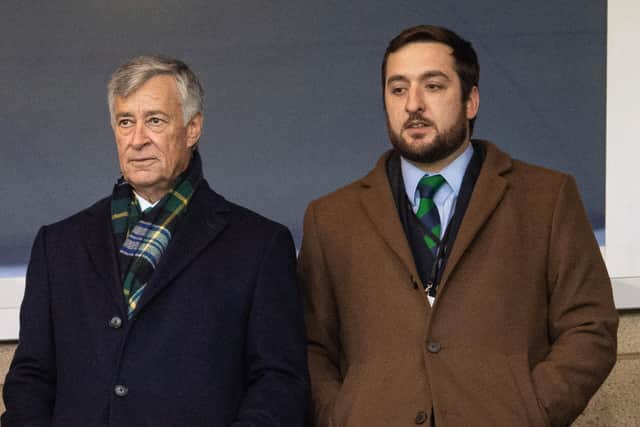Ian Gordon: Hibs head of recruitment on how his role works, using data and the English club model influencing how things are done
and live on Freeview channel 276
The son of American owner Ron Gordon was made the club’s head of recruitment in October after former sporting director Graeme Mathie left Easter Road.
Some fans questioned the 29-year-olds credentials to take on the job, but Gordon junior has now spoken for the first time about how the recruitment process works under him.
Advertisement
Hide AdAdvertisement
Hide AdHe was in position for the January transfer window, when Hibs brought in more than ten new player, but he has been scouting for the club since 2019.


“The recruitment team works together on very much a data driven list to start with,” he told the Down The Slope podcast. “It’s a combination of data driven and agent recommendations, with live scouting.
“From those points, we dwindle down the list and the team together presents those shortlists to the committee and that’s how we start the framework to pursue the target."
Gordon admits that they have followed the recruitment model Brentford use… to an extent.
Advertisement
Hide AdAdvertisement
Hide AdHe added: “We have our own approach on it but we have definitely taken some of their methods for their B team model and their recruitment model.
“When signing B team players, it’s very much long-term with a clear player pathway. It’s so we know that if we have to replace a first team player in that position, we have a viable option in the B team.
“We identify our targets early and work to that list as the months go past.”
A month after Gordon was appointed, Hibs sacked Jack Ross and replaced him with Shaun Maloney in December. Gordon admitted that much of the work had been done on transfer targets alongside Ross, and that changes had to be made after he was sacked.
Advertisement
Hide AdAdvertisement
Hide AdHe explained: “That was a big road bump for us as we’d done a lot of work early on under Jack. When the change happened, a lot of the positions stayed the same but the style of play needed to change, so we made some minor adjustments to the targets we had been working on.
“But we still went after a lot of the targets we previously had on the list.”
Decision by committee has been the approach to transfer targets, with the club hierarchy all having an input into which players are brought to Leith.
Chief executive Ben Kensell insists that’s more to do with the decision making process being a collaborative one rather than the management structure of the club.
Advertisement
Hide AdAdvertisement
Hide AdHe said: “Probably quite a bit is made of transfers and committees and things like that. It’s very simple; a transfer isn’t dictated by one person and no one person at this football club makes a final decision on anything.
“What you have to bear in mind is that Shaun will have a view, Ian will have a view and our owner, Ron, will have a view. By virtue of that, it is a committee because it’s a decision by committee. I need to bring that together and make sure we make the right decisions for the short, medium and long-term of the club.
“Someone has to make a decision and it’s usually either myself or Ron. If I'm honest, Ron will usually make the decision over me! The reason I use the word committee is because it’s the best way to describe a collaborative approach to making a decision, rather than a dictator-led sort of approach, which isn’t how we run the club.”
Asked to rate the January transfer window out of ten, Kensell replied: “I’d give it a seven, the reason being is because we addressed areas where we were lacking in depth across the park. It was probably too busy, too transitional as a window. There was too much change and you wouldn’t really encourage that much change usually. It was a bit of a revolving door and you’d want it to be a bit more processed."
Advertisement
Hide AdAdvertisement
Hide AdThere was one deal in particular that brought that score down as far as Kensell is concerned.
He continued: “The reason it’s not higher than a seven is because of losing Martin [Boyle]. If we’d retained Martin, then I think we would have been looking at one the best transfer windows we’d had in a long, long time at the club.
“But we didn’t and we need to face up to the fact that we lost a very good player that severely dented our offensive options. Was it perfect? No. Are there gaps? Yes. Were we ever going to deliver a nine or ten out of ten window? No, because there was too much much change required.”